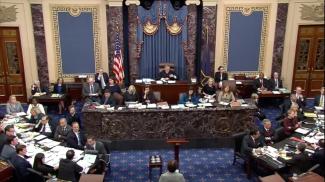Blog
Eroding checks and balances

Part of the mission of D+C/E+Z is to promote democracy. It has become considerably more difficult to fulfil since President Donald Trump took office in January 2017. His rhetoric and his attitudes resemble those of strongmen in developing countries and thus boost their position. His statements and u-turns in the Covid-19 crisis exemplified that attitude, but it is important to keep an eye on the big picture.
It is worrying to observe that the US president keeps systematically attacking the independence of both the courts and the media. Jan-Werner Müller of Princeton University and other eminent scholars have elaborated how populist leaders do these things with an eye to eroding constitutional checks and balances. The goal is to increasingly avoid any kind of serious oversight.
That trend is evident in the USA. People around the world have been paying attention to how President Trump’s impeachment evolved. They have also witnessed how that trend accelerated after he was acquitted.
Many wonder what the role of Supreme Court Chief Justice John Roberts was as presiding officer during the Senate trial. The Supreme Court is soon supposed to decide on what the president may keep secret and what information concerning his personal finances are of such public interest that Congress must get access. I’ll return to the issue below. In the Senate trial, however, Roberts intervened once at an early stage, admonishing both sides to behave in a civil manner after one somewhat rowdy session. As the trial unfolded, however, the impeachment managers in the House of Representatives were arguing their case precisely, diligently and eloquently. By contrast, President Trump’s defence team not only told lies, but Roberts did not stop them from repeating them several times.
No, it is not true that Republicans were excluded from the impeachment hearings in the House, all Republican members of the relevant committees were free to attend. No, it is not true only Democrats decided what witnesses to hear; the truth is that even witnesses requested to appear by Republican Congress people confirmed what the other witnesses had said. No, it does not make sense arguing that a president must have broken a federal law in order to be removed from office. When the US constitution including the impeachment clause took force, there was no federal criminal code.
Senator Mitt Romney spelled these things out clearly. He was the only Republican to vote for President Trump’s removal from office. He acknowledged what had become clear to any disinterested observer outside the USA: President Trump withheld military aid from an ally at war in order to achieve something that would support his personal re-election effort.
Senator Romney, in his short speech on the Senate floor, only pointed out the worst flaws in the defence team’s argument. There were many more – so many indeed, that it would be beyond the scope of a blogpost to list them all. It needs to be mentioned, nonetheless, that the CNN watching public around the world did notice that the defence team’s reasoning was incoherent, and yet almost all Republican members of Congress ultimately endorsed it.
At first, they insisted that there never was a quid pro quo. Then it became known that John Bolton, the president’s former national security advisor, was about to publish a book in which he argues that, yes, President Trump wanted the Ukrainian government to announce an investigation into Hunter Biden before military aid would resume. Anyone with only a minor understanding of criminal law around the world knows that such a clear quid pro quo is an indicator of bribery, which of course is a federal crime.
When it became obvious beyond doubt what Bolton had to say, the Senate majority decided that the previously denied quid pro quo suddenly did not matter at all anymore. They could have heard Bolton as a witness, but they opted for not exercising oversight of the administration. Such oversight, of course, is the constitutional duty of legislators in any representative democracy.
Witnesses’ careers disrupted
What has been happening since the acquittal actually proves just how important such oversight is. President Trump has adversely interrupted the careers of those who bore witness in the impeachment hearings. Before the sentencing of one of his personal allies, who was found guilty of crimes, tweets of him expressed his anger about the judge and the jury. A few hours later, Attorney General William Barr personally intervened in that case in an unprecedented manner, reducing the Department of Justice’s sentencing proposals.
Next, President Trump fired the acting director of national intelligence. The apparent reason was that this officer had fulfilled his legal duty to inform the relevant Congress committees of ongoing Russian interference in US elections. The new acting director of intelligence happens to be Richard Grenell, who will simultaneously stay on as US ambassador to Germany. He has a track record as a Trump sycophant, but no serious experience in running a secret service. So far, hardly anything has been done by the Trump administration and the Republican dominated Senate to protect elections in the USA this year.
It is important to note that Ambassador Grenell does not understand Germany and is particularly ignorant of our depressing history in the 20th century. The way he has been trying to pass orders to German private-sector companies and to intervene in our domestic politics proves that he is either totally unaware of – or fundamentally unconcerned by – the lessons we learned from our depressing history of Nazi rule and later a communist dictatorship in the eastern part of the country. For example, he told company managers to stop doing business with Iranian counterparts and repeatedly praised right-wing politicians.
After the Second World War, consecutive US administrations did an impressive job of promoting democracy, ensuring the establishment of the current constitutional order in West Germany and allowing the Federal Republic to become a close ally. Past enmity was not forgotten. It was dealt with consciously and overcome.
Most Germans find it irritating that the Trump administration is constantly peddling half-truths and plain falsehoods. When totalitarian apparatchiks did so in our despotic past, it served a purpose. The subtext of presenting things as factual that were quite obviously freely invented was that everyone was going to be forced to accept the government’s view. Independent reasoning was neither welcome – nor useful. Understanding the truth would not make a difference. Of course, other people in other countries with a history of authoritarian rule see these things exactly the way most Germans do.
Remembering Bill Clinton
When former President Bill Clinton was impeached, I was doing research in India. People there were paying close attention. It impressed them that legislators would act so assertively. At the same time, they found it odd that something as common and trivial as lying about extramarital sex should be considered to be of great constitutional relevance. That Clinton was acquitted and showed contrition inspired admiration for constitutional checks and balances.
The lesson Indian observers learned from the Trump impeachment and its aftermath are different. They knew before that the current US administration does not promote democracy, but is only pursuing narrowly understood American interests. They have now seen that checks and balances are eroding fast in the USA.
A the end of last month month, the Supreme Court was supposed to start hearing a case concerning President Trump’s personal finances and whether Deutsche Bank, which in recent years has built a track record of being involved in major scandals, must pass on relevant information to Congress. The decision would not due before June, but weeks before the hearing even started, President Trump was attacking two Supreme Court justices by use of Twitter. The initial hearings did not take place because of Covid-19. Should the decision in this matter be postponed for too long, that might allow Trump it run for re-election and still not disclosing his personal finances as he promised before the 2016 election - and as has been the general norm for decades.
Most German citizens hope that the Supreme Court will enforce oversight. We want constitutional democracy to prevail everywhere, not only in Germany. We would find it most encouraging if the Supreme Court ruled in a way that facilitated legislators’ oversight responsibilities. Should, however, a narrow majority rule in favour of presidential secrecy in matters of vital public interest, observers around the world – and especially in countries with histories of authoritarian rule – will read it as Republican-appointed judges protecting a Republican president and further erosion of checks and balances.










